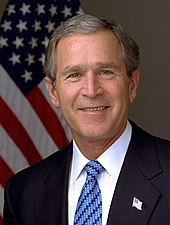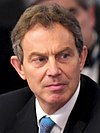A Journey
Blair discusses Labour's future following the 2010 general election, his relations with the Royal Family, and how he came to respect President of the United States George W. Bush.
Some families of servicemen and women who were killed in Iraq reacted angrily, with one antiwar commentator dismissing Blair's regrets over the loss of life.
[4] It was announced the book would be published by Knopf in the United States and Canada[5] under the title A Journey: My Political Life;[6] and in Australia, New Zealand, South Africa, and India by Random House.
"[13] BBC political correspondent Norman Smith said Blair's severest critics would see the donation as "guilt money" for taking the UK to war against Iraq in 2003.
"[14] A spokesperson for the Stop the War Coalition supported the donation, but added, "No proportion of Tony Blair's massive and ill-gotten fortune can buy him innocence or forgiveness.
"[10] A spokesman for Blair said that it had long been his intention to give the money to a charity; he added aiding soldiers undergoing rehabilitation at the Battle Back Challenge Centre was "his way of honouring their courage and sacrifice.
"[12] The announcement was welcomed by Chris Simpkins, director general of the Royal British Legion, who said, "Mr Blair's generosity is much appreciated and will help us to make a real and lasting difference to the lives of hundreds of injured personnel.
[22] Social occasions with the Queen are also recalled, including a gathering at Balmoral Castle where Prince Philip is described manning the barbecue while Elizabeth II dons a pair of rubber gloves to wash up afterwards.
He says that he stretched the truth "on occasions past breaking point" in the run-up to the 2007 power-sharing deal which enabled the return of devolved legislative powers from Westminster to the Northern Ireland Executive.
[27] He would make the same decision again with regard to Iran, warning that if that country develops nuclear weapons it will change the balance of power of the Middle East, to the region's detriment.
[28] Of the war dead he says, "I feel desperately sorry for them, sorry for the lives cut short, sorry for the families whose bereavement is made worse by the controversy over why their loved ones died, sorry for the utterly unfair selection that the loss should be theirs.
[32] According to Blair, Brown subsequently attempted to blackmail him, threatening to call for a Labour Party inquiry into the 2005 Cash for Honours affair during an argument over pension policy.
"[26] Within hours of its launch, A Journey became the fastest-selling autobiography of all time at bookseller Waterstones,[37] where it sold more copies in one day than Peter Mandelson's The Third Man: Life at the Heart of New Labour had done in its first three weeks earlier that year.
[41] When Blair arrived for his first book signing at a leading bookshop on O'Connell Street in Dublin on 4 September, demonstrators heckled, jeered and threw eggs and shoes at him.
The demonstrators – anti-war protestors and Irish republicans opposed to the peace process – called queuing customers "traitors" and "West Brits".
[46] Several days following the launch of the book, Blair appeared on the series premiere of ITV1's breakfast television programme Daybreak, where he criticised the Dublin protestors as a small minority given undue media attention.
He wrote that it made Blair seem "likable, if manipulative; capable of dissembling while wonderfully fluent; in short, a brilliant modern politician (whatever his moans about the media).
"The chapter on Iraq is tightly argued in some detail, which may persuade those with open minds to recognise that the decision to join the US invasion was a reasonable, if not very successful, one, rather than a conspiracy against life, the universe and everything decent," he said.
[58] Mary Ann Sieghart, writing for The Independent said, "whatever its faults, and toe-curling passages, [A Journey] has many good lessons on how to succeed in both opposition and government.
By turns honest, confused, memorable, boastful, fitfully endearing, important, lazy, shallow, rambling and intellectually correct, it scampers through the last two decades like a trashy airport read.
In The New Yorker, British novelist John Lanchester called A Journey "a detailed account of scrambling, scraping, horse-trading, bluffing, and fudging the way to a deal – a remarkable combination of the ramshackle and the historic.
"[66] Tim Rutton of the Los Angeles Times also gave the memoirs a favourable review, declaring it "a political biography of unusual interest.
Writing for Australia's The Sydney Morning Herald Alexander Downer, who served as Foreign Minister in the government of John Howard, gave A Journey a favourable review: "His [Blair's] commitment to humanity is sincere and convincing, and his personality infectiously amiable with a delightful sense of self-deprecating humour.
"[68] Konrad Yakabuski, a senior political writer for Canada's The Globe and Mail, was also positive: "If Tony Blair has not continued to agonize over the tough decisions of his prime ministership, he does a pretty good job of persuading otherwise in A Journey.
"[70] The Queen reportedly felt a "profound sense of disappointment" in Blair for breaking with protocol by revealing in his memoirs sensitive details of private conversations he had with her during his time as prime minister.
[72] Ed Balls, a Brown ally who served in his government as Secretary of State for Children, Schools and Families said, "It would have been much better if the memoirs had been a celebration of success rather than recriminations.
Former Conservative minister Norman Tebbit wrote on Telegraph.co.uk, "A Journey seems to be dominated by Blair's anxiety to be seen as a great political leader who changed his country for the better.
David Goodhart of Prospect magazine wrote that in both Peter Mandelson's memoir The Third Man and the first volume of Alastair Campbell's Diaries (covering the 1994–97 period), "Blair is important, but a rather weak figure buffeted by events and by Gordon Brown.
"[82] A similar theme was echoed by David Runciman in The London Review of Books, where he reflected that Mandelson's memoirs "provide a much more complete account of the Blair/Brown relationship", including details of Operation Teddy Bear, an aborted plot from 2003 to curb Brown's increasing influence as Chancellor by dividing the Treasury to create a separate Office of Budget and Delivery that would be controlled directly by the Cabinet Office.
Writing for the British Politics journal, academic Mark Garnett analysed the Blair and Mandelson memoirs in detail, observing that while A Journey gives a more in-depth account of what he termed "contemporary British government", The Third Man is a more satisfying read: "The Third Man was a worthwhile effort for Peter Mandelson's reputation, while Tony Blair has journeyed in vain.



